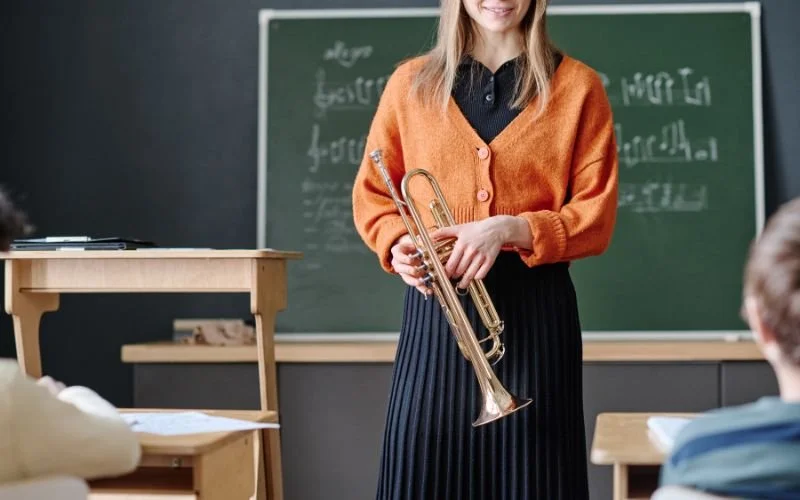Clara Schumann (1819 - 1896): biography of an exceptional pianist and composer
Clara Schumann is not just "Robert Schumann's wife". A renowned pianist, composer and piano teacher, she marked the XIXᵉ century with her talent and determination. How did a child prodigy become one of the greatest pianists of her time manage to impose her name in a world dominated by men? What do her piano works, romances and concertos still tell us today?
Between virtuosity, passion, personal drama and resilience, Clara Schumann's extraordinary destiny.
Childhood and family: a strict but musical upbringing
Clara Wieck was born in Leipzig in 1819, into a family where music was everywhere. Her father, Friedrich Wieck, was a piano teacher who saw in her a prodigious talent from an early age. Her mother, a singer, left home when Clara was 5. So it was her father who took charge of her musical and personal education, with an almost military discipline.
Beneath this rigor lies a little girl with an exceptional ear and an incredible musical memory. By the age of 9, Clara was already giving her first public concerts.
From her first steps on stage to an international career as a pianist
At a time when child prodigies fascinated audiences, Clara was soon touring Europe. By 1831, she was performing in Paris and Vienna, where her playing dazzled as much by its power as by its sensitivity. It is said that Chopin himself was impressed by her virtuosity.
Her reputation grew, and she quickly established herself as one of the most celebrated pianists of the XIXᵉ century. At just 18, the composer published her Piano Concerto in A minor, a work marked by astonishing maturity for her age.
On her tours, Clara Schumann chose to play Bach and Beethoven as much as Chopin and Brahms. These program choices were not insignificant: they shaped the public's ear and laid the foundations for what would become the great classical repertoire.
🎹 Clara Schumann spent her life at the piano... What about you? With Simply Piano. Learn, revise and have fun at the keyboard, even solo.
Clara and Robert: a story of love... and music
It was while studying with Friedrich Wieck that Robert Schumann met Clara. Their love, thwarted by his father's fierce opposition, developed into a full-blown romance. They finally married in 1840, at the cost of a legal battle.
The couple enjoyed an intense, artistic and personal relationship. Clara supported Robert's career, premiered his works in concert, and composed music herself. But her life as a mother (she would have 8 children) and Robert's fragile state often forced her to put her own creative work on the back burner.
No more flying pages or heavy binders. With Newzik, your scores live in digital format: simpler, more fluid, more modern.
Download the Newzik app (7-day free trial)
Works that tell the Clara Schumann story
Clara Schumann's musical style was like her: sensitive, profound and intimate. Her works privilege emotion over demonstration, with a gentle style that says a lot with a little. There's a lyricism close to the human voice, a tenderness in the nuances and a restrained strength that touches the listener directly.
1833-1835 - Piano Concerto in A minor, Op. 7: begun at the age of 13 and orchestrated with the help of Felix Mendelssohn, this concerto already reveals the maturity and ardor of the young Clara. She premiered it herself in Leipzig in 1835, under Mendelssohn's baton.
Clara Schumann: Piano Concerto in A minor, Op.7 - Alice Burla & SJSO
1834 - Four characteristic pieces, Op. 5: a series of short piano pieces in which Clara Schumann already asserts her style: sensitive, expressive and full of character. These pieces are in the Romantic tradition.
1836 - Romance variée, Op. 3: dedicated to her future husband Robert Schumann, this piano work plays on nuances between gentleness and passion.
1841 - Lieder, Op. 12 (with Robert Schumann): we often think of Clara Schumann behind the piano. But in this collection of lieder composed with her husband, she also shows her talent for the voice, with pieces of great sensitivity.
1843 - Three Romances for piano, Op. 11: composed when she was already an established pianist, these pieces reveal an intimate, delicate language. Clara herself considered them some of her finest piano works.
Clara Wieck-Schumann - Romance n°1 op. 11 - Clementine Dubost
1853 - Three Romances for violin and piano, Op. 22: dedicated to the violinist Joseph Joachim, these works seduce with their poetry and balance between the two instruments. They are still frequently performed in concert today.
Clara Schumann: Three romances for violin and piano Op 22 - Esbjerg Ensemble
Vocal works and piano pieces: in addition to her large-scale works, Clara also enjoyed more intimate formats: lieder and short piano pieces.
Did you know? 6 anecdotes about Clara Schumann's life
The first pianist to play from memory in concert. At a time when musicians still read their scores, Clara surprised everyone by playing by heart. Today, it's the norm... thanks to her.
A child prodigy applauded by Goethe. At a concert in Weimar when she was just 12, the great writer Goethe was present and praised her talent.
A life marked by 8 maternities. Alongside her career as a pianist, Clara gave birth to 8 children, most of whom she raised herself. She had to cope with bereavements - several of them died young - and absences due to touring.
Guardian of the memory of Robert Schumann. After her husband's death, she organized, edited and disseminated his work, ensuring that he was recognized as one of the greatest Romantic composers.
Close to Johannes Brahms. Much has been written about their relationship: artistic friendship, musical complicity... Some also see it as a secret love affair.
An international celebrity. Clara played before the greatest courts of Europe (Vienna, London, Paris), and her reputation sometimes even surpassed that of her husband.
A life in music: the journey of Clara Schumann
1819: Clara Wieck is born in Leipzig, into a family where music is omnipresent.
1828: aged just nine, she took to the stage for the first time in a public concert.
1831-1835: Clara Schumann embarks on a series of European tours, including Paris and Vienna.
1835: She became close to Robert Schumann, her father's pupil at the time.
1840: after a legal battle with her father, Clara married Robert Schumann. This marriage marked the beginning of a life together made up of passion, shared music, but also financial and personal difficulties.
1856: Robert Schumann dies at the age of 46 after years of mental illness. Clara, widowed at the age of 37, continued her career as a pianist.
1857-1870: Clara became close to Johannes Brahms, with whom she shared an intense artistic relationship. She continued to tour throughout Europe, contributing to the evolution of the piano repertoire by promoting Bach, Beethoven and Robert Schumann.
1878: accepts a professorship at the Hoch Conservatory in Frankfurt.
1891: Clara gives her last public concert, after a career spanning more than sixty years.
1896: Clara Schumann dies in Frankfurt at the age of 76. She is buried in Bonn, beside Robert Schumann.
From stage to posterity: the destiny of a pioneering woman
Clara Schumann is much more than a name associated with Robert. She was a visionary pianist, a composer with a singular voice, an attentive teacher and a woman who paved the way for generations of artists. Her works, like her interpretations, continue to resonate today, reminding us that behind every note was a life full of courage and passion.
From Clara Schumann to the present day, music has always evolved with the times. Why not rethink your own playing too?
With the Newzik application, you can group your scores, annotate your works, collaborate with other musicians and take your library with you wherever you go.




